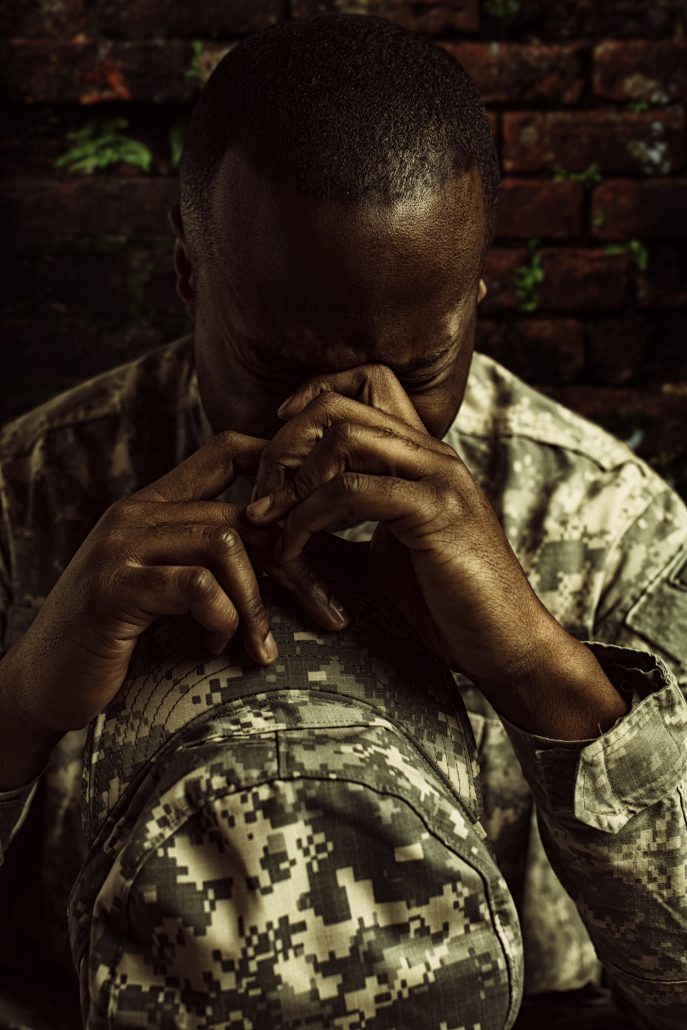The Veteran Mental Health Problem We Need to be Talking About

(This content is being used for illustrative purposes only; any person depicted in the content is a model)
When we talk about fighting the addiction problem in America and better understanding substance use disorder, we have to acknowledge those who are at a specific risk for suffering from substance use. Far too many American soldiers come home only to fight another devastating, heartbreaking battle.
With addiction being considered a mental health issue, it should be clear the contribution of overall mental health makes to causing substance use disorder (SUD) in many cases. Depression, bipolar disorder, generalized anxiety disorders and post-traumatic stress disorder (PTSD) are all mental health issues that often associated with addiction.
Some of those susceptible to mental health disorders and substance abuse are those who fight for the safety and freedom of our country; our Veterans. So we need to acknowledge the mental health issues that the men and women who sacrifice everything for this nation are suffering through. We need to talk about how to best understand these conditions, and how to best treat those in need.
Veteran Mental Health Disorder Statistics
According to the RAND Center for Military Health Policy Research:
-
20% of Veterans who served in either Iraq or Afghanistan suffer from either major depression or PTSD
-
5% of Veterans in these two categories have suffered a traumatic brain injury
According to the U.S. Department of Federal Affairs:
-
More than 2 out of 10 veterans with PTSD also suffer from SUD
-
In the wars in Iraq and Afghanistan, about 1 in 10 returning soldiers seen in VA have a problem with alcohol or other drugs.
-
Almost 1 out of every 3 Veterans seeking treatment for SUD also has PTSD.
-
War Veterans with PTSD and alcohol problems tend to be binge drinkers.
-
Among all U.S. adult deaths from suicide, 18% (7,403) were identified as Veterans of U.S. military service
Probably one of the most troubling statistics comes from a study by the Substance Abuse and Mental Health Services Administration (SAMHSA) which tragically revealed:
Only 50% of returning vets who need veteran mental health treatment will receive these services.
That is an extremely troubling number. It says a lot about how Veterans are struggling to get the help they need when you realize that only around half of them ever get it.
Veterans and Substance Abuse
One of the hardest issues to address when examining the veteran mental health issue is substance abuse and SUD. It is also one of the most important aspects of Veteran mental health treatment that need to be acknowledged.
The National Institute on Drug Abuse (NIDA) reports that substance abuse among veterans is strongly connected to their experiences in combat and how they struggle to cope with these traumas. Various NIDA studies indicate that:
-
25% of Veterans returning from Iraq and Afghanistan showed signs of SUD
-
In 2008, active duty and veteran military personnel abused prescription drugs at a rate that was more than twice the rate for the civilian population
-
In 2009, the VA estimated that around 13,000 vets from Iraq and Afghanistan suffer from alcohol dependence syndrome and require veteran mental health treatment for this problem.
PTSD and SUD
A lot of people, even those who are not Veterans but have experienced great trauma, use substances to self-medicate and deal with PTSD. Even for those who have never had an issue with substances or may never have even used substances, PTSD increases the risk an individual can develop a drinking or drug problem or SUD.
To make matters worse, PTSD and SUD can likely lead to other problems in life, including health. These Veteran mental health issues can often be associated with:
- Physical pain
- Relationship problems
- Professional/school problems
Ultimately, using drugs or alcohol in combination with PTSD might seem to make things easier, but will actually make them a lot worse. It creates a vicious cycle of numbing and re-traumatizing.
Better Treatment for Veteran Mental Health and Addiction
Many advocates for Veteran services, including the National Veterans Foundation (NVF), believe:
- More funding needs to be allocated for Veteran mental health care services so that every veteran has easy access to this type of care.
- Excessive wait times at local VA facilities need to be addressed in order to grant people the access they need to these services.
The NVF website states:
“We can no longer look the other way or continue to underfund the mental health care system that our veterans use.”
This should absolutely be a priority. Strengthening the system that provides mental health care not just to citizens who are suffering, but to our vets who have given so much and desperately need help, is crucial to saving lives from substance use disorder.
Not only does Palm Healthcare Company understand the importance of providing quality addiction recovery treatment, but we also know how important dual diagnosis treatment is for those who suffer from serious mental health conditions like PTSD or major depression along with addiction. Better treatment means addressing both conditions simultaneously, to help the individual heal holistically.
Palm Healthcare Company also knows how important it is to help those first responders and Veterans that put their lives on the line every day. That is why we are a proud sponsor of the Harrigan Foundation’s Annual Run to the Rescue 5K to raise money for the treatment of first responders and veterans.
To find out more about this event, visit the link here:
Harrigan Foundation’s Annual RUN TO THE RESCUE 5K

